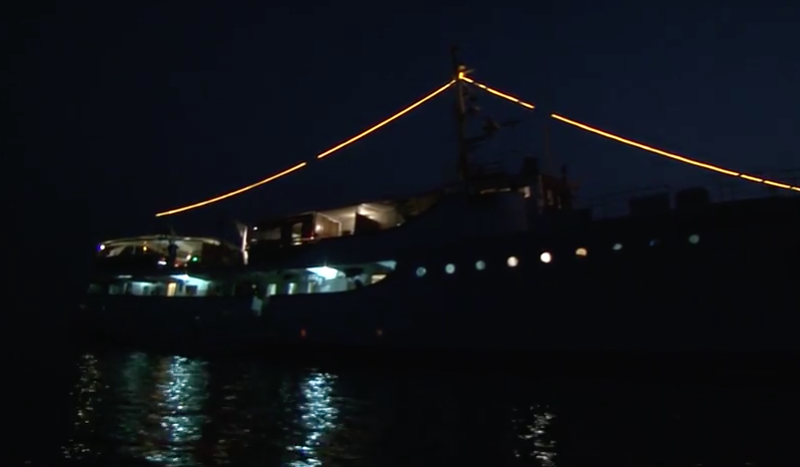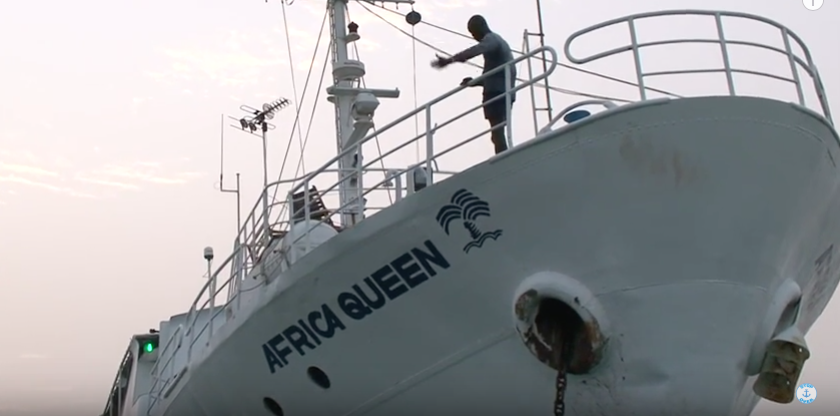
Guinea Bisseau is a country in which the socialistic revolution failed which was meant to modernise it and making it to a rich country after the independence from the Portugeese was won 1974. Many Swedes as well as other western revolutionaries went there to help the country to develop, but----
Thus the Bijagos islands is still a untouched by modern consumerism. In the beginning we meat with an old blind man who has to make his living as street musician. His way of making music is very interesting as it leads us direct back to the roots of the American blues. The Africans are really inventive and creative in their making music instruments by almost anything, here an old tin can furnished with strings makes up a welltuned guitar.
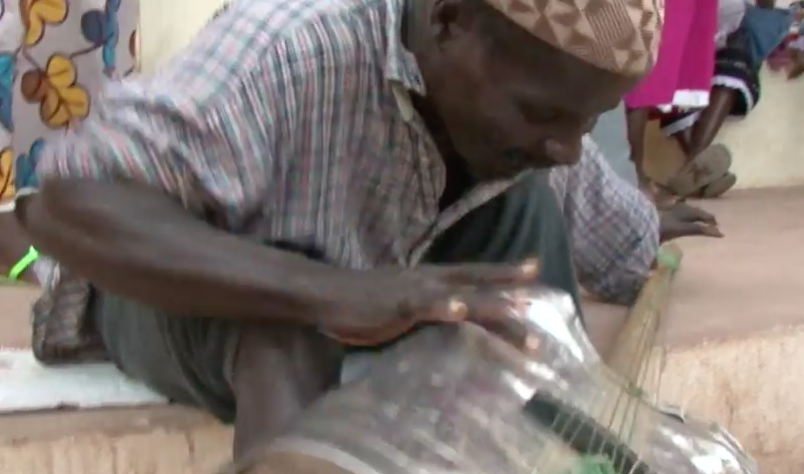
Many boats are waiting in the harbour - the Bijago express is going to the main island Bubaque. The trip there takes about four hour and arrives after nightfall.
The old ship Africa´s queen is almost 60 years old but brushed up from times to time with the simple means, and now it is taking the tourists out to the forgotten islands of Bijagos, where people live as they have done since tines immemorial, to hidden villages, animists dance and white beaches.
Ousman the chief cooker on African Queen does his shopping in the shops in Bisseau, to make supplies for a whole week on board.
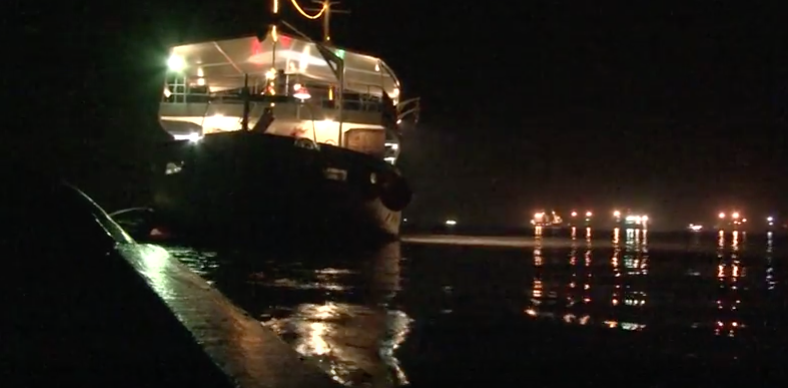
Guinea Bisseau gets a good amount of rain and a great variety of crops grow there The only export of the country is palm oil and cashew nuts. Now after years of exploitation by selfserving leaders the country is somehow forgotten by the international community and the people are struggling to get it back on its feets . The guinean are largely animists and in the more remote regions the ancestral beliefs and tradition are deep rooted.
In these districts of the Capital the youngsters are rehearsal for carneval.
This evening the passengers will get to know their boat. Tomorrow at daybreak they will weak up to a new world
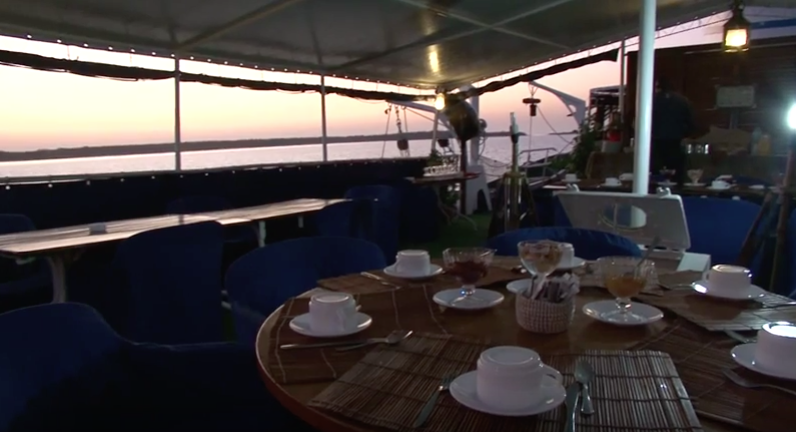
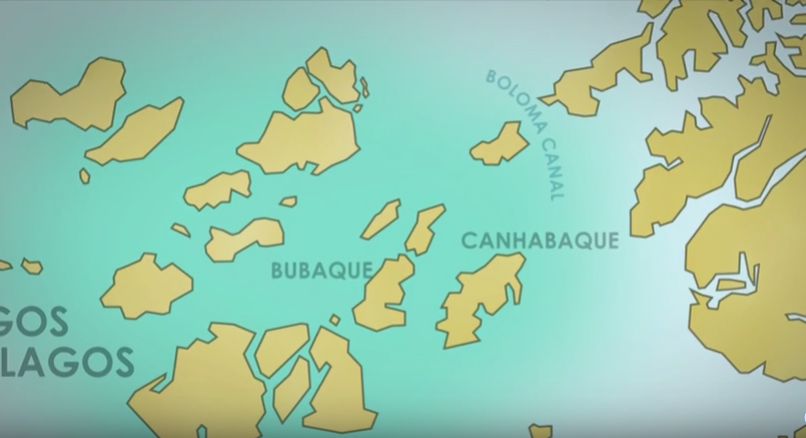
The African Queen leaves the port of Bisseau and aim for the island south of Bubaque called Canhabaque,. The crew on the boat is 90 % Senegalese, maybe because Bisseau has no schoool for training seamen.
The passages between the islands takes a lot of concentrations as there are a lot of sandbanks and rocks. You really have to be very very cateful and get to know the area. Experience really helps.
Even thoug the Bijago island are lying on a busy sea-road and quite close to the mainland it have remained unspoiled
Of the 88 islands only about 20 are inhabited. In addition to the problems with navigation there are also the terrential rains that barrels every day through the winter season from april to september.
In 2008 UN took up the case of the case with this unspoiled realm and designade the island of being a world biosphere reserv
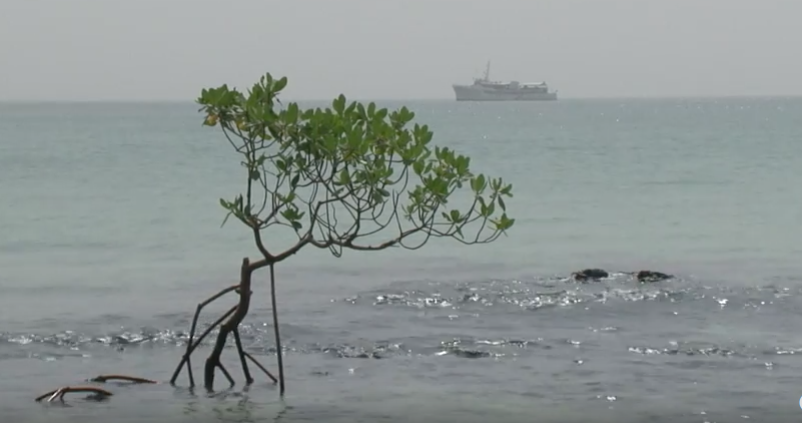
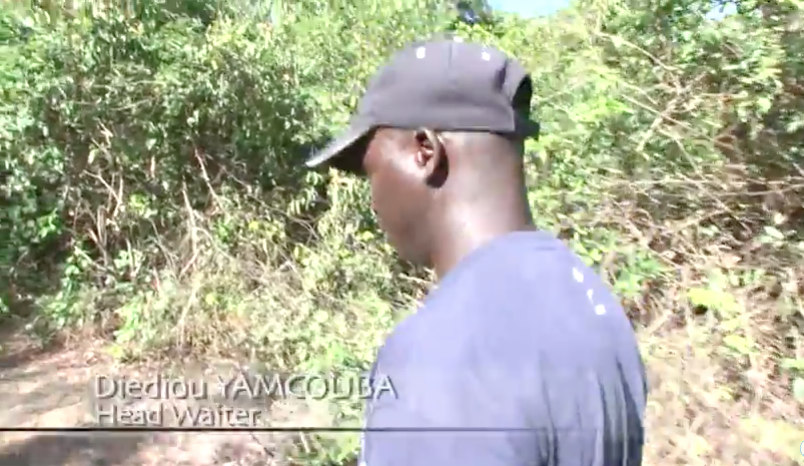
Diedio is the boat´s ambassadeur in its relations to the inhabitants of the island:
"Every time I approach a village I have to let everybody know that I am coming, so the they are not taken bu surprise." And first after he has got the permission from the inhabitants to enter their the village, he can go back and fetch the touristes for all of them to enter it together.
"It´s the way it is when you visit someones home; you must show repect.", sais Diedio. "This way they know what is to expect so that they are in a receptive mood".
Diediou hads been working on the Africa Queen for twenty years and over the time he has become the boat´s amassadeur to the Bijagos.
He never comes emptyhanded. The villages are always grateful for his gifts. Especially fish and medicine.
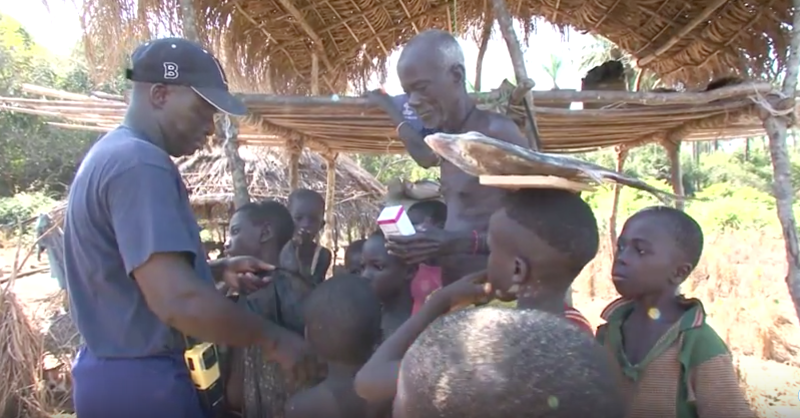
This is the center of the village
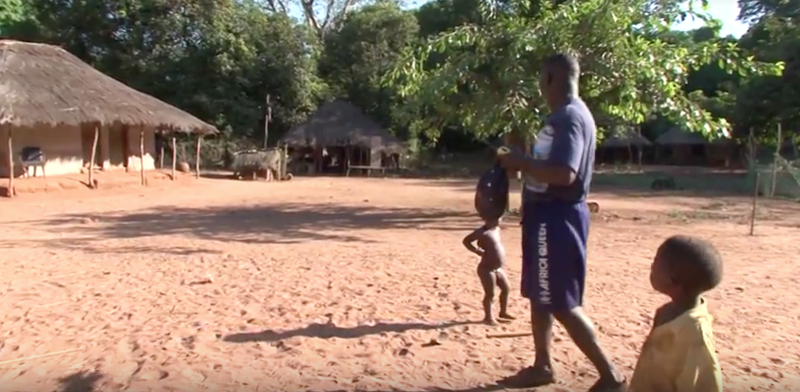
And high up here in the tree is some kind of message sender.
"Its like a telephone. Every village on Canyabaque has such a Sender. If they have a party or a ceremony they have their rules and that´s important to respect."
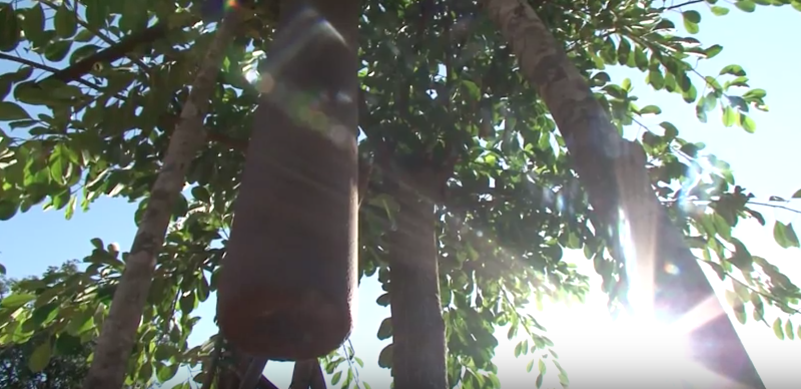
Now Diediou has gone back to the boat the fetch the touristes on board for their first encounter with the Bijagos.
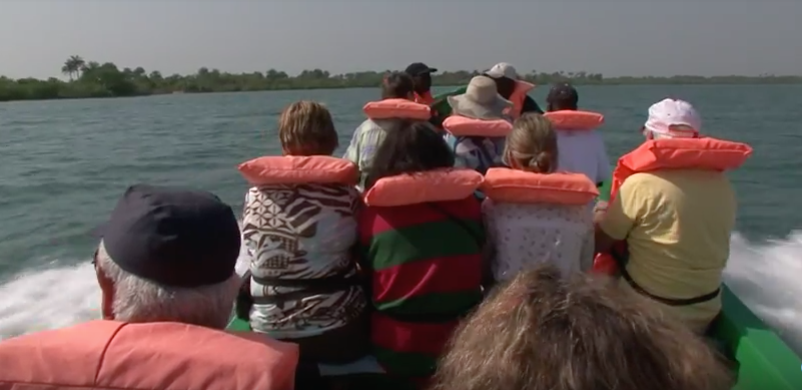
Their first impression is that of a normal African village. It takes a curious eye and a keen observation that the Bijago society has got very strict codes, that is important to respect.
"We have to wait for the permission and get a visa otherwise we may run into problems. We can´t just go bargain in!"
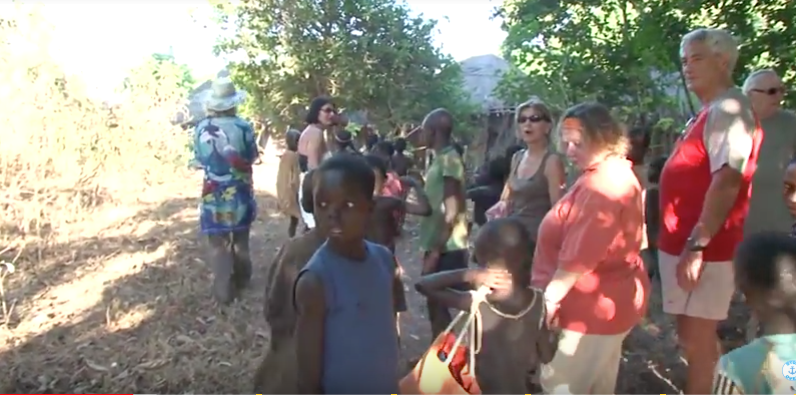
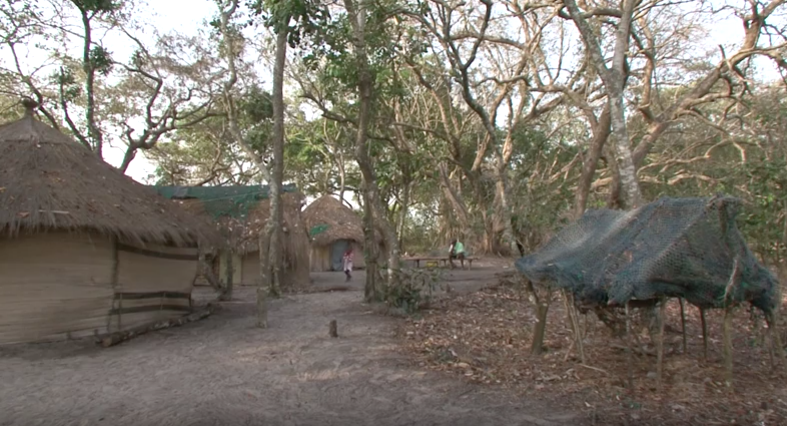
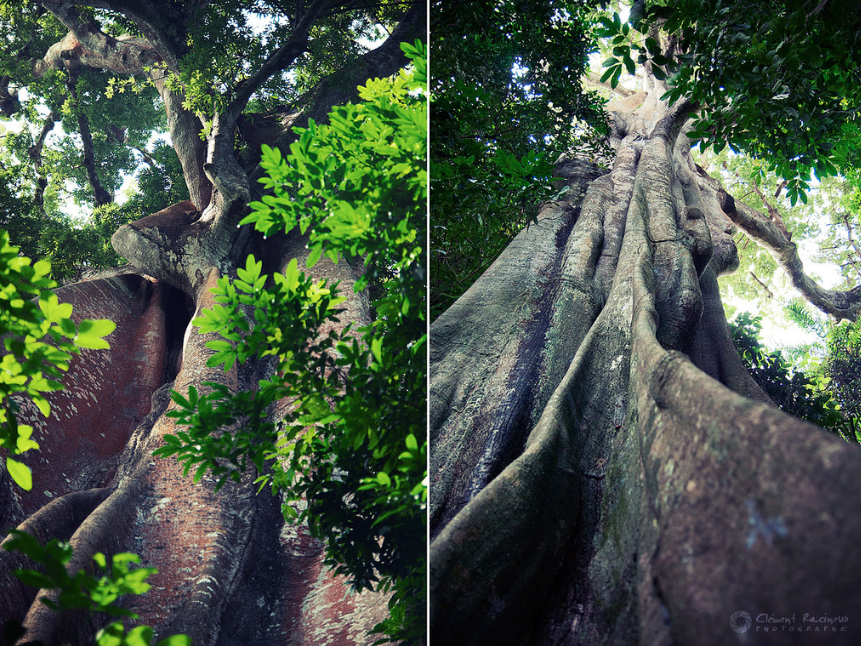
Trees are the pillars of Bijago society, The Bijagos always built their villages in the shade of the kapo-trees away from the beaches and they plant their ricepaddies beneath the palmtrees, they build their houses from leaves and branches. They live in these dwellings while they are cultivating their crops.
In the crown of the palm trees you may find these bottles of palm sap - they ferment the sap to get palm wine
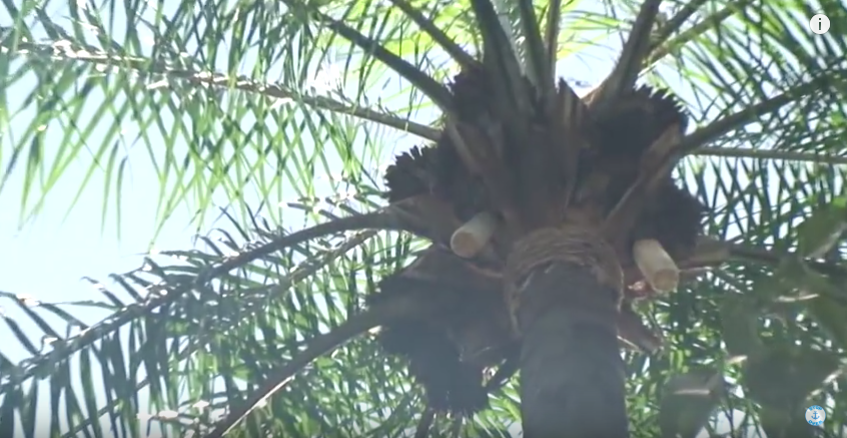
Men get togheter to drink their palmwine in a special mens lodge beside the village.
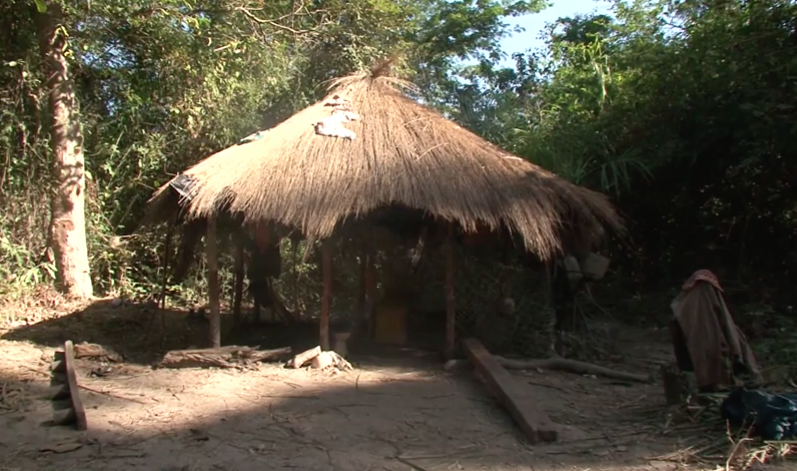
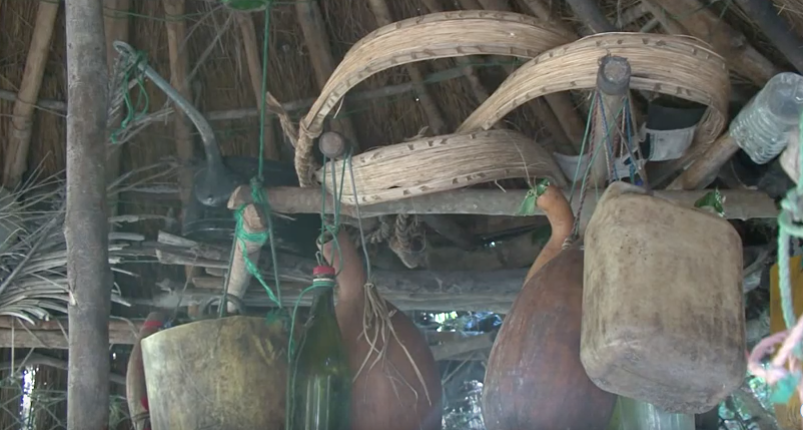
This is the drinking horn for the wine:
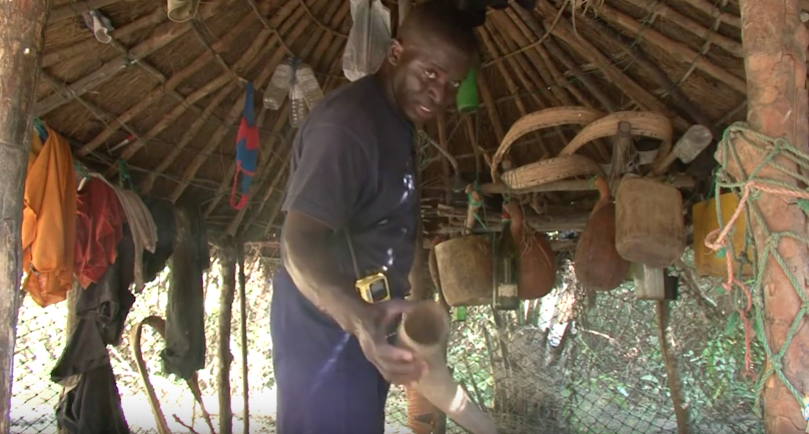
These vwoven leaves are like signs post in the forest and if you cannot read them , you can very well get into trouble.
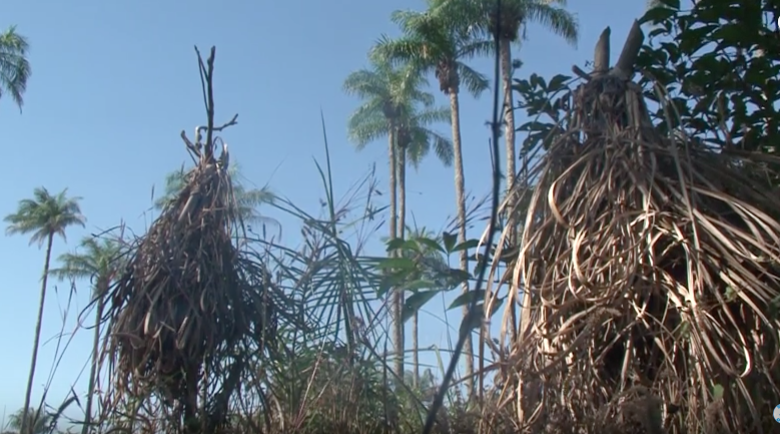
As for the sociallife structure it is very tightly organised. Every member has their exact position and its been like that since the dawn of time.
In a Bijago family the house belongs to the woman and she even designs her own house with the help of her friends. The women go together to fetch the straw for the roof.
Here on the Bijagos its the women who chooses her husbands. There are seven to ten children per family so the father changes. He moves on but the children stay with their mother.
The separation takes place when the man is initiated. Everyone knows hes going to leave his wife. That´s how its done. Next year yo initiation the woman has another husband in the view and enter in the initiation period. They have to.
When they tell the man next year its time to go for the initiation, the woman has already another man in view for when the man enter into his initiation period They have to leave the village and to live in the forest for about seven months and during that time they are not allowed to adress a woman directly.
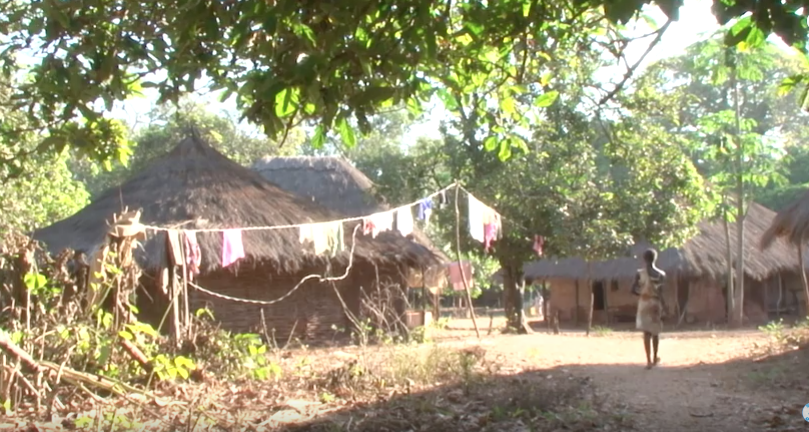
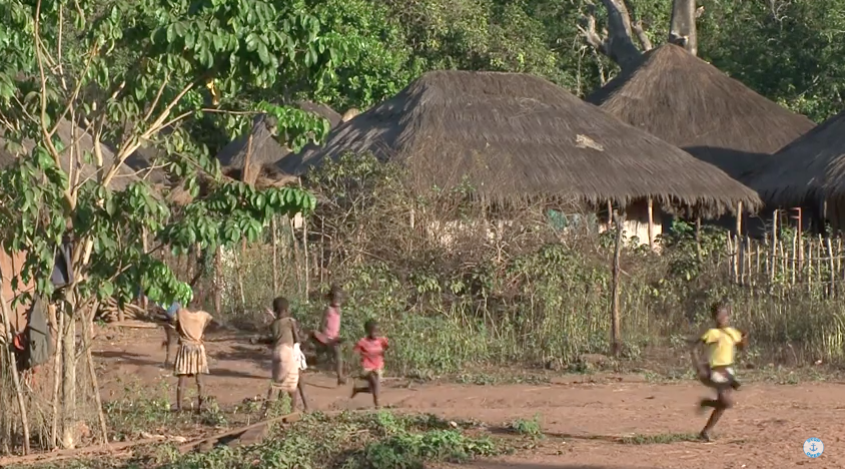
Tourists visiting the village
Ones permission has been granted you can ask all the questions you want, Well almostall.
These are the leaves she gathers in the forest. Now she is going to dip her skirt in it to dy it.
-Quelle coleur?
-Black and brown.
I asked her to show the leaves she uses for the dy. But she refuse because its a secret.
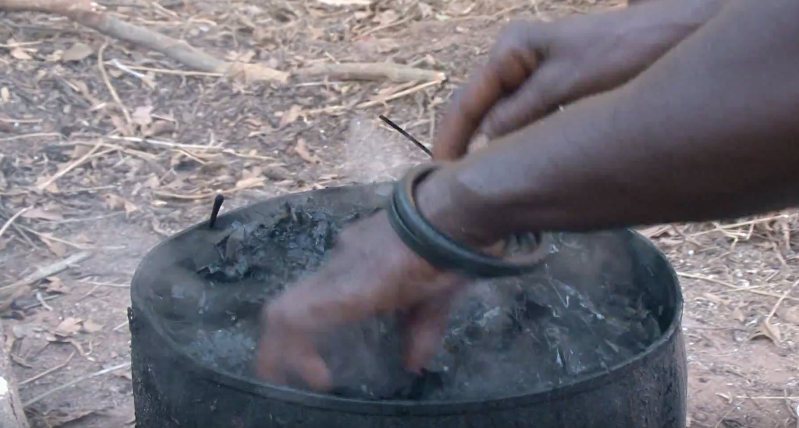
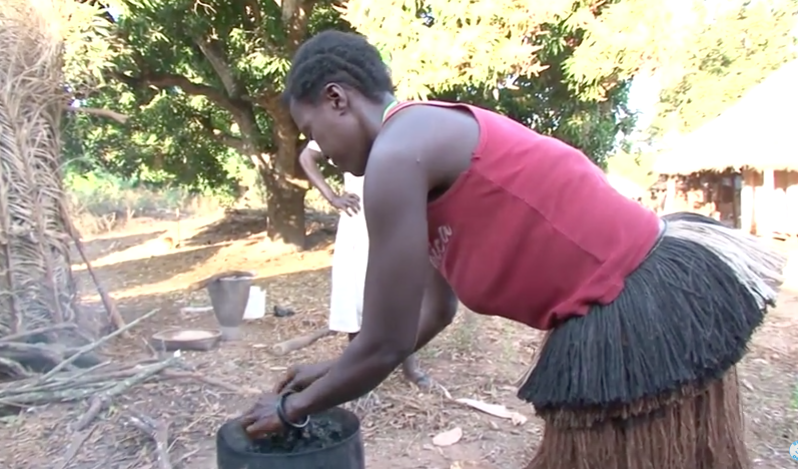
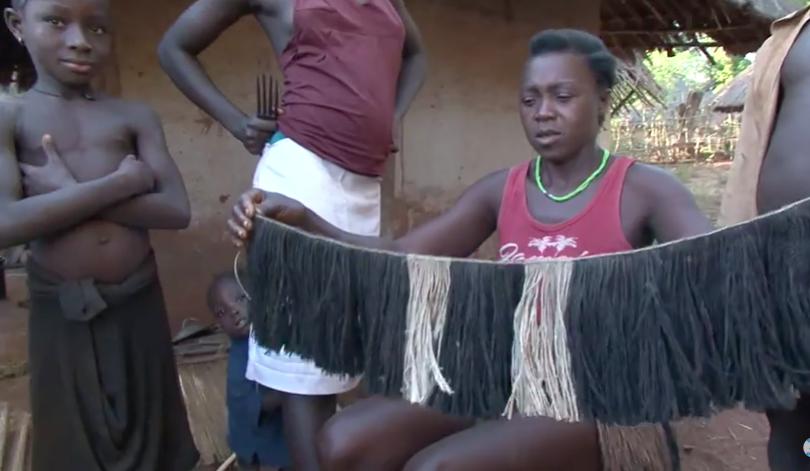
The tourists are visiting the village:
With or without the visitors the life in the village goes on as normal. Each villager goes about their busines, with the laughing children hanging around the strangers.
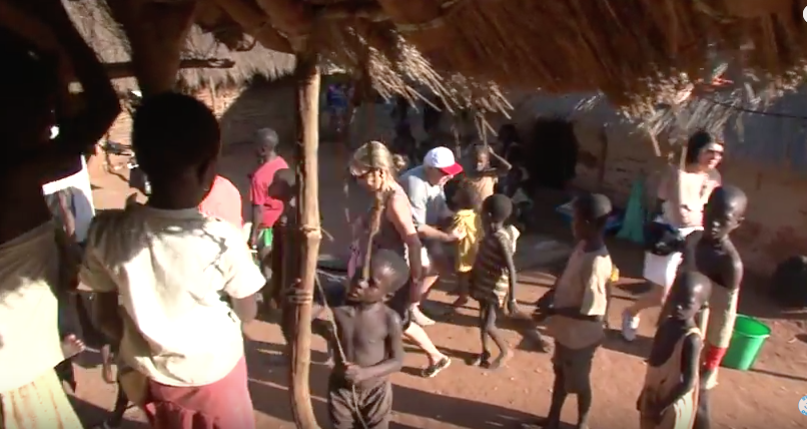
The meeting of the two cultures often leads to misunderstandings, For the Europeans know nothing about Biajos way of life and the villagers likewise have no more than a vague idea about Europe.
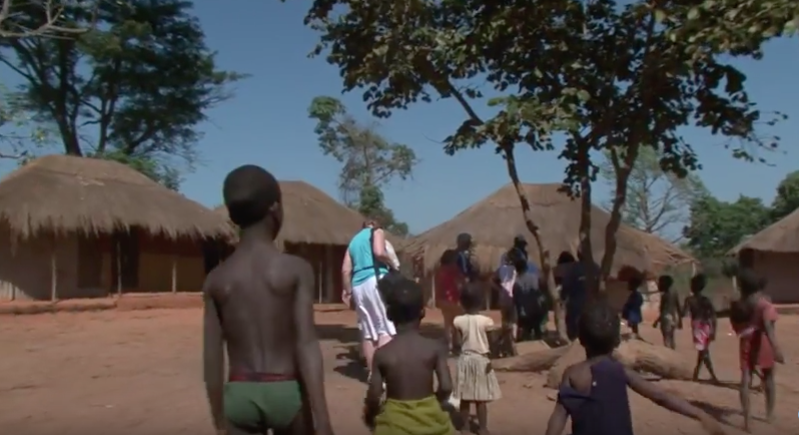
"They are not like us. They don´t know how to climb a palm tree. The come by boat and they usually ask me to dance for them so they can take a picture of us. They even wanted me to climb up in a palmtree to harvest the palmwine. I did not but my wife and my child gave me a funny look. We´re not used to that kind of thing here in Canhabaque. All I know is that they eat well. I don´t know what, but I am sure they eat well."
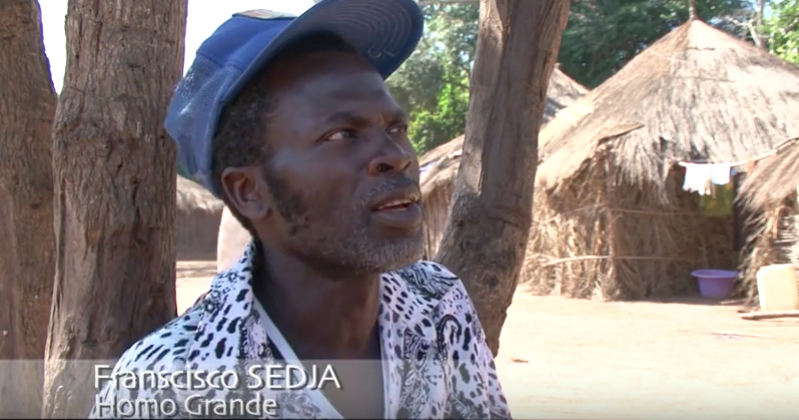
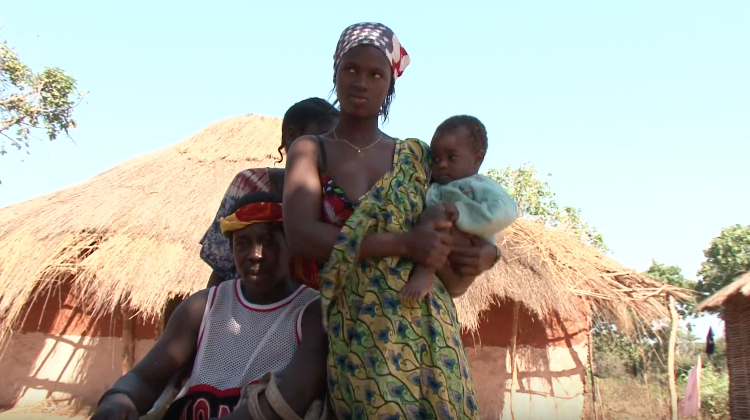
For ages the mainlanders lived in fear for the Bijago islanders. The used to surge out on the sea like the vikings in their piroges with a bulls horn on their heads and pillage the coast. Even the european navigators on their opposing saling ships were not spared. The colonisation put on end to the maritime expeditions. Now the Bijagos only have small inoffensive piroges
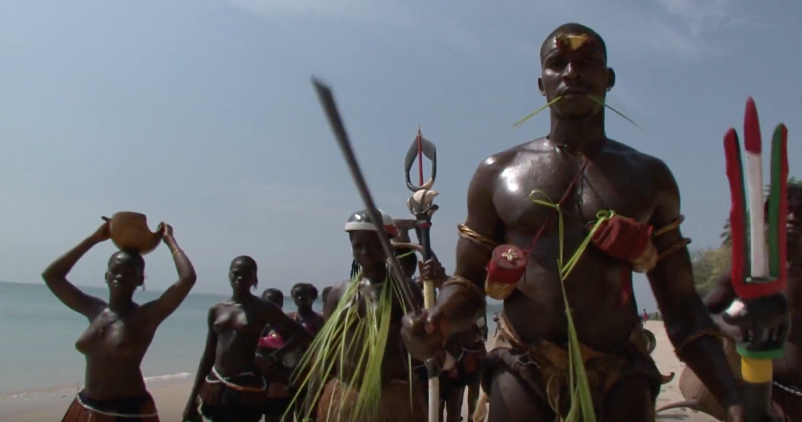
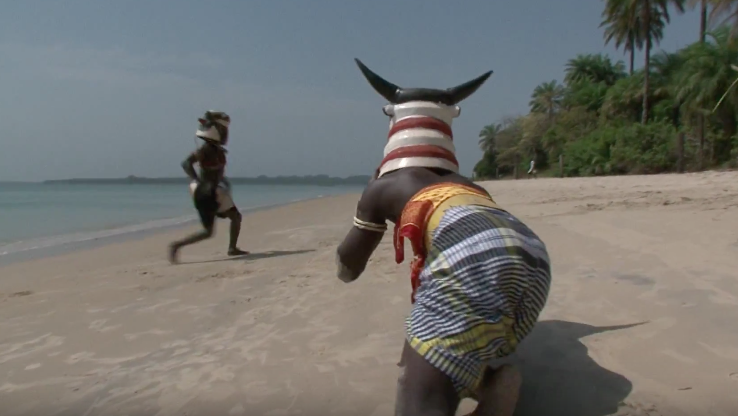
With their weekly incursions to the Bijago territory, which now is now a UNESCO natural reserve the tour operators are realising that they are threadinng sensitive ground.
The biodiversity of these islands is unmatched on the entire African coast.
The marine fauna counts over 155 species of fish. The beaches of this rich biotop are also homes to five of the worlds species of seat?
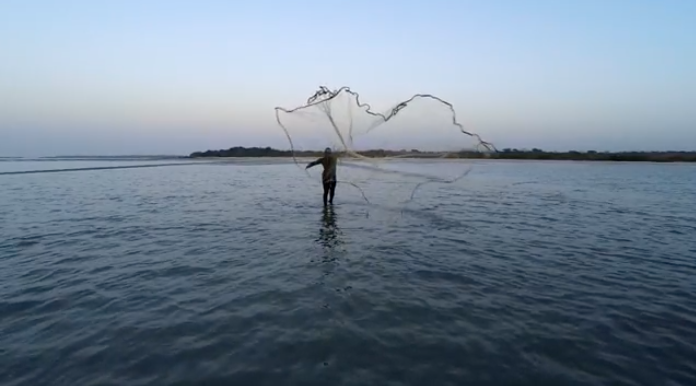
Like elsewhere in this region rtice is the staplefood in the Bijagos islands. They grow it in a very wellkept forest, it´s the men´s job to clear the ground, then the women and the children do their planting, tend the shoots and come up with clever ideas how to scare the birds off.
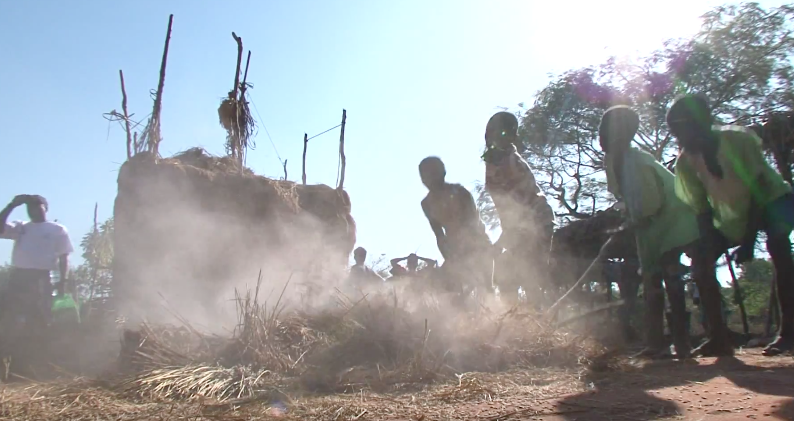
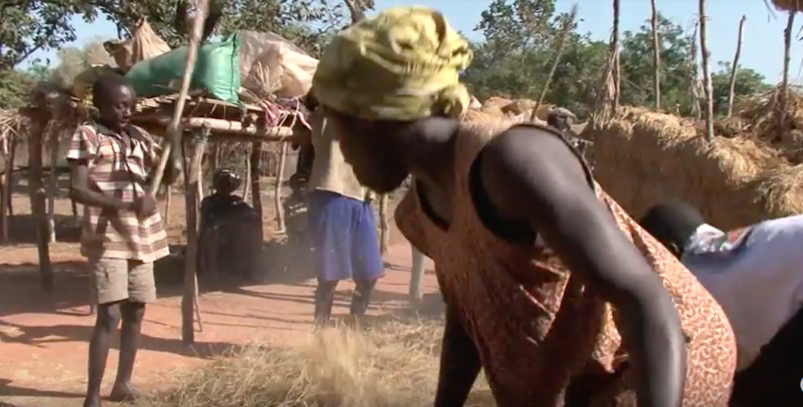
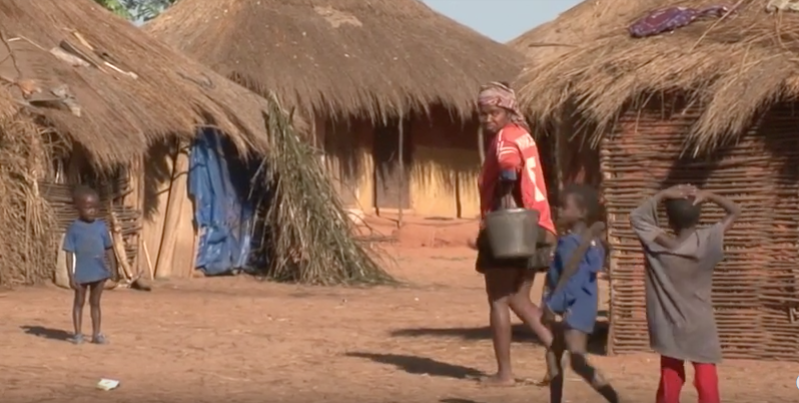
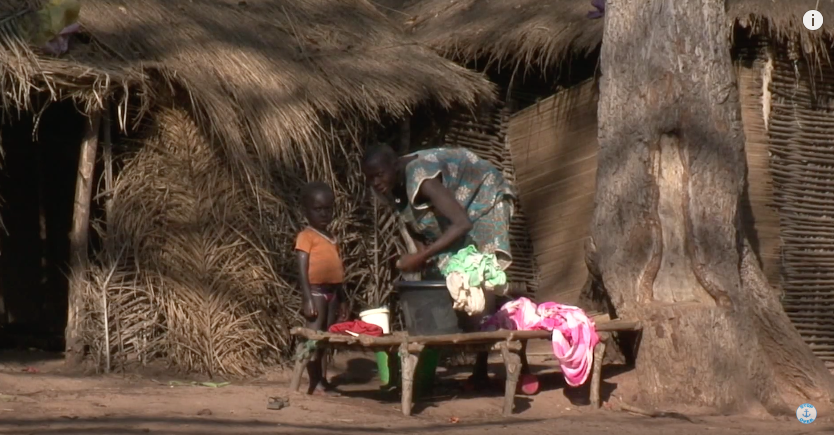
Right near the rice field they have set up a village of temporary huts. They stay a few months working their crops. Then after the harvest and freshing the villagers all head back to their permanent dwellings, which are usually on another islands. But rice is not enough. They have to complete their diet with hunting and gathering
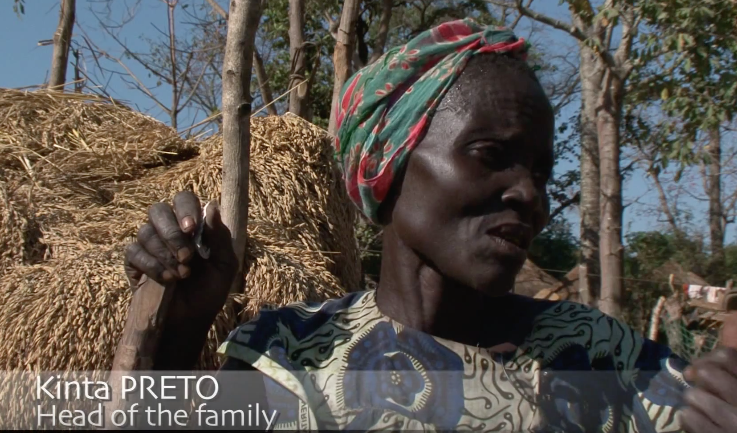
Kinta, the head of the family:
"In addition to rice we eat roots like wild maniok. We find it in the forest and make flour of it. We also gather berries that grows near the shore and palmnuts. This rice here is not enough food for the whole family, because we are so many of us. They gave us two plots of land to grow but we didn´t get enough rain this year. The harvest isn´t good. It wouldn´t be enough.
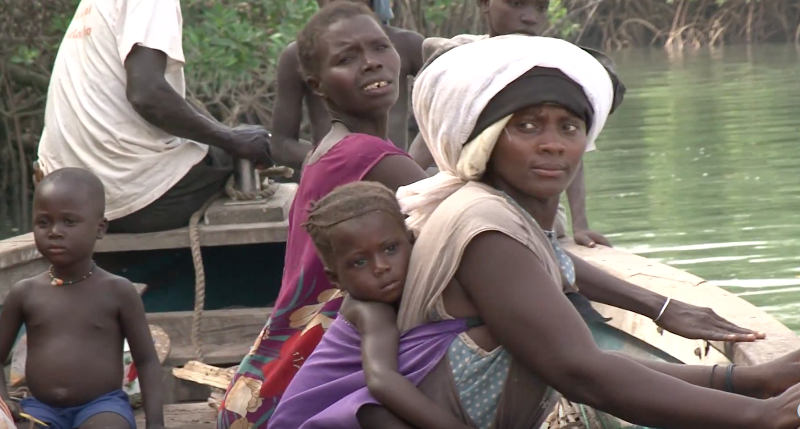
Its back home after the harvest All the generations pile in to be brought home before the rainy season. But this is not their own traditional pirogue. It was lent to them by the hotel so that they could turn back home more quickly and keep the rice from being wet.
A conqrete example of the indispensible solidarity that exists between the ancestral property owners and the new settlers.
The African queens has been coming to these island for two decades, and has always prakticed the systemof exchange with the villagers. No money ever changes hands between the boat and the villagers but each part is duty bound to be generous.
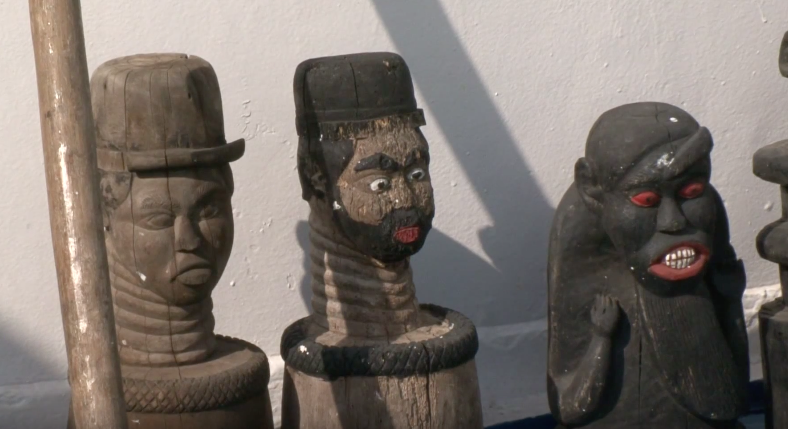
These totems you see here are gifts. Each village at Canhabaque gave us a totem. Totems are all sourcerers; They protect the boat and all of us who work on board. The magic has done a good job for this boat for i t came out here from a french shipyard at 1952. The conscience and caring crew keep the African Queen in perfect ship-shape, so even now its continues sailing under its power of two diesel engines.
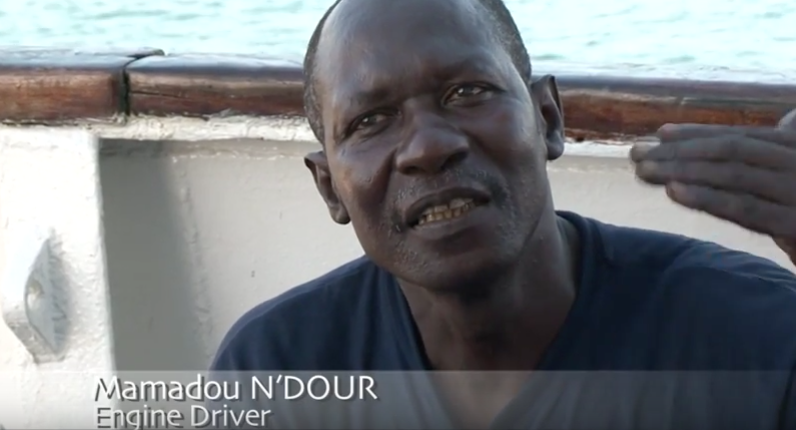
Mamadou N´Dour, engine driver: "You know there are things you have to preserve for future generations. This is a beautiful piece of mashinery that has lasted. So that means its really something The factories are closed but there is always someone who manage to dig up the parts we need for to keep the motor running smoothley.
In the Bijagos every moment of life is decided by the spirits. And in order to speak with them one has to do the proper offerings. And almost all the offerings it is the Omo Grande who call upon the spirits with the display of vehements.
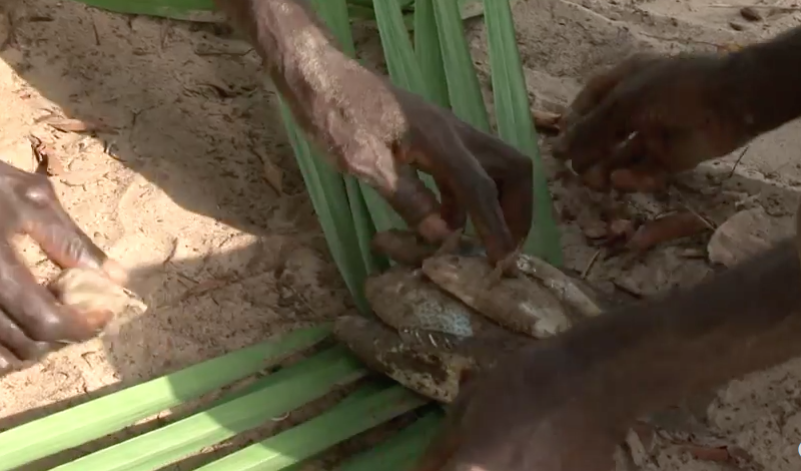
These men has made it through their initiations. When they werre 27 they left their wives to go off for the sacred forest for several years. And at the island Canhabaque the rite lasts seven years, a record compared to the usual practice in Africa. When they come back to society with the prestigeous title of Omo Grande they can take another wife. They are considered to be wise men and they intercede with the spirits in most of the ceremonies. Here the chicken serves as a messeanger. The way he runs when his head is cut off answers to the enigfmas of life. They say that the spirituell power of the Bijagos are very strong and that many politicians come here to consult them.
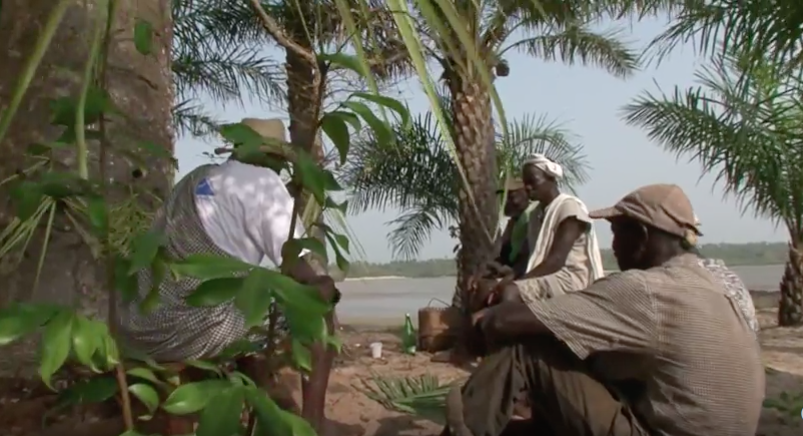
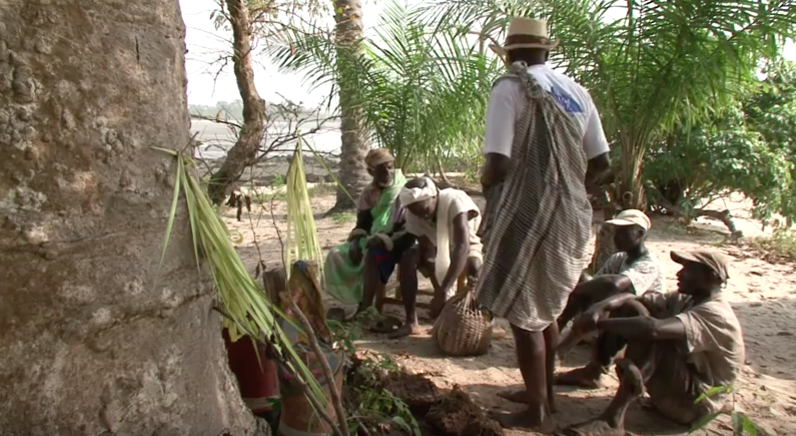
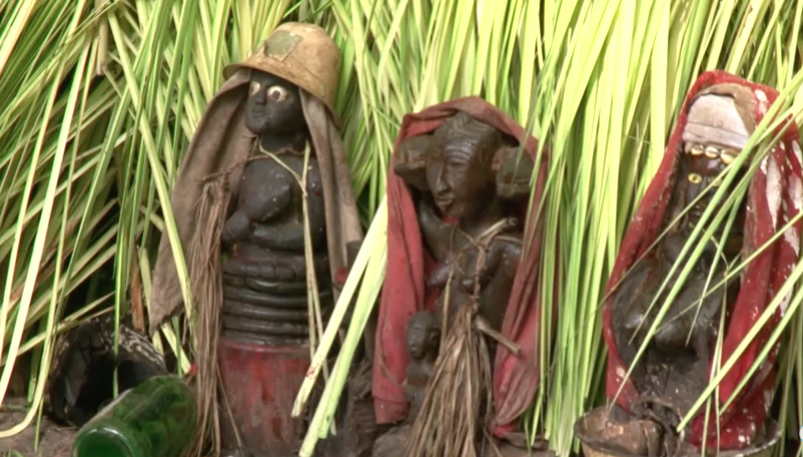
Quintino Mendes Head of the Village - First they com here to make their request. Then they come back here to thank the Gods. We even have had people here from America
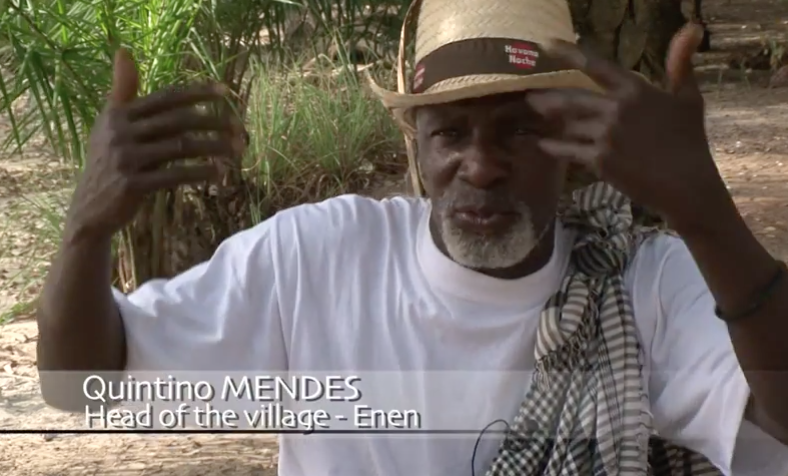
HOTEL AT RUBANA ISLAND
The same rules apply to this second luxory Hotel set up at the island of Rubana. The ancestors approved the construction and the Bijagos rules about sharing is part of everydays routin.
No walls no fences . The spirits must be sure to protect and ensure the prosperity of the establishment through the intermediation of Omo Grande.
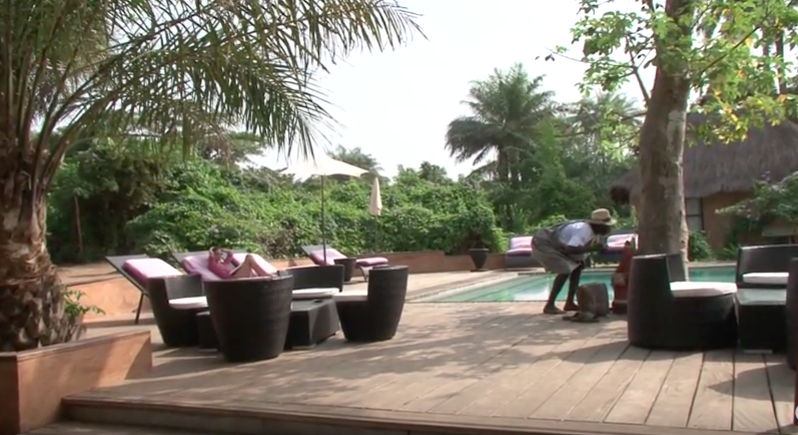
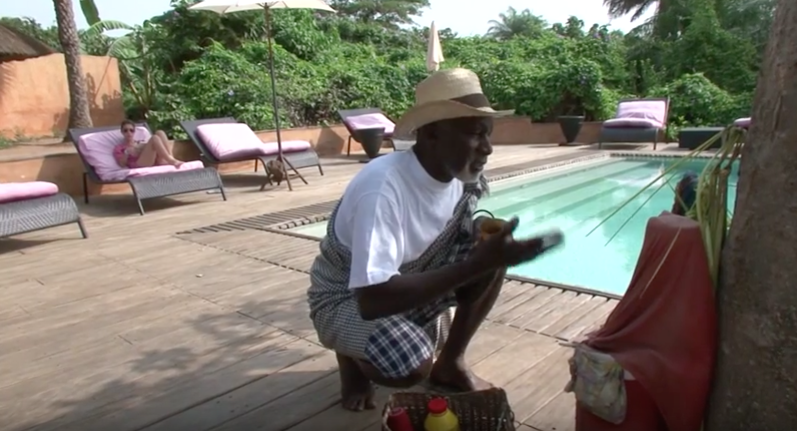
Abass Camara, head waiter:
"The ceremony is a necessary part of life here. It påare of our upbringing. We have to carry it on, doing everything that our ancestors did. Its our school, if you fail you´re an ignorant. When the initiate speak you cannot stay with them. You are not allowed to listen to their conversation. Even if you have been off for some time to join the ceremony, you´ll have to go back to work. We always have to go to the ceremoniens here.
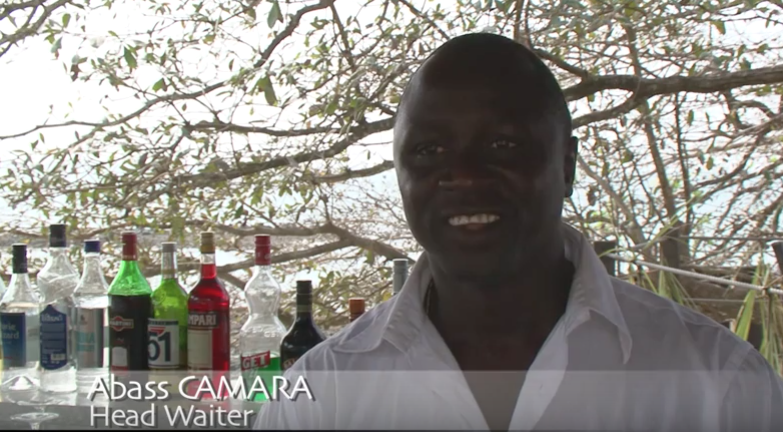
"In Punta a Chaca many of the employees come from the Bijago islands. We have been trained by the hotel owners and very quickly adapted to the demands of the work."
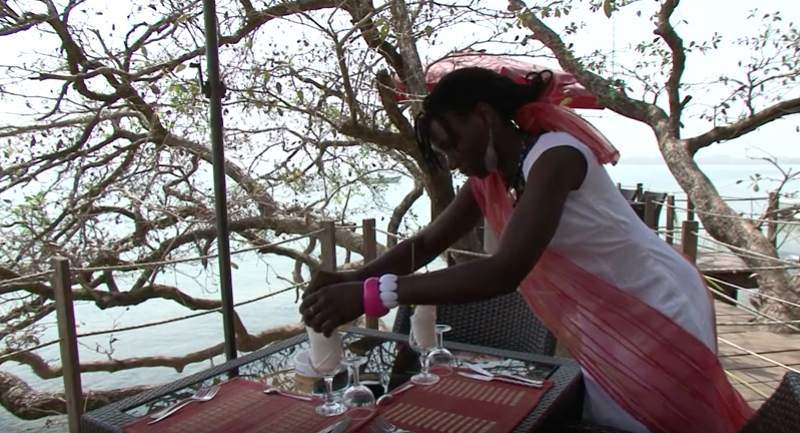
There presence is also a link to the village that sold the land to the hotel. For outsiders who settle here always have have to bring something positive to the community.
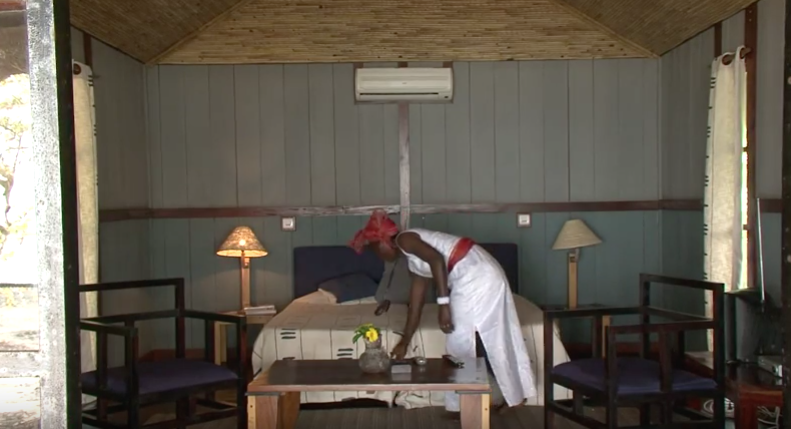
In the past before the first hotels were built the the outsiders who visited the islands were msinly fishermen; shark fishers in special, by senagalese and guinean fishermen. You must adapt and offer the islanders something they dont have,
These young men are performing some kind of ceremony taking the guise of sharks themselves, very impressing indeed:
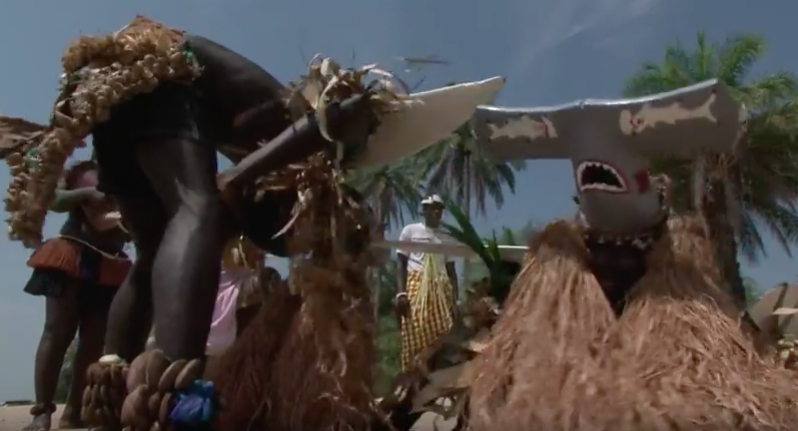
Alas Silla comes from Guinea Con Acri. He is a fishermen, and as many before him he came to try his luck in this zone, which is specifically protected from the big factory thrallers.
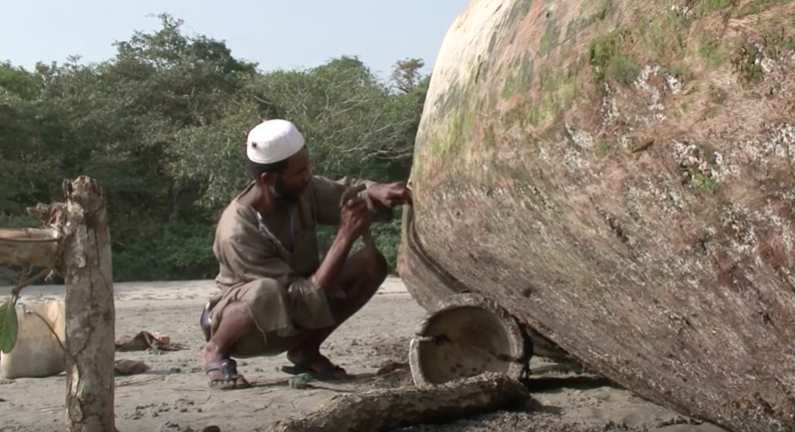
Alia has been accepted on this Bijago Island mainly due to his wife C
Khady. She is a healer; A gift she inherited from her mother. Since she arrived to the Bijago with her husband, the bench outside their huts is always crowded with people searching for help.
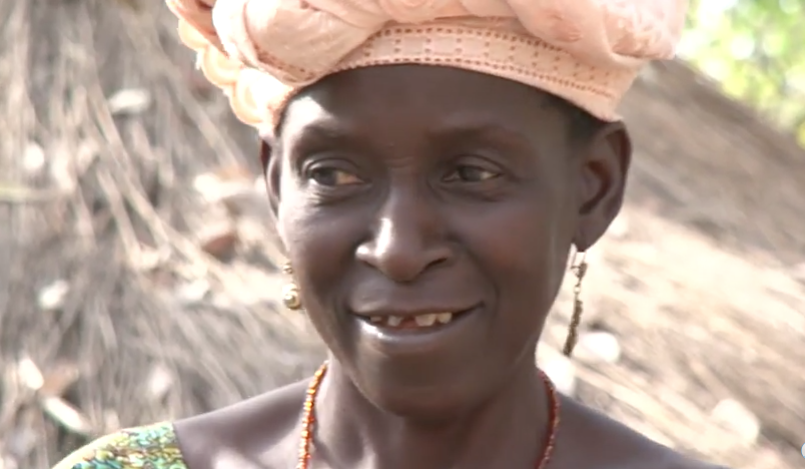
This man has been crippled with pain for several weeks.But what´s worrying him is that his brother, who lives on another islands suffer from the same symthoms. He´s come to consult for the two, for he suspects that rather than an illness it´s some mystic forces at work. Khady casts the caorie shells and then starts to read them. She speaks nalu a very rare language, her husband translates into portuguese creol, the patients speaks only Bijago, why there is a need of a forth person to complete the concversation.
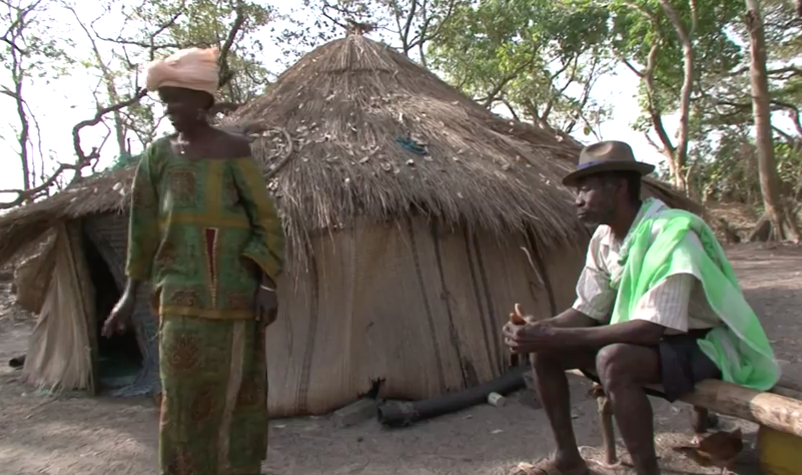
In most of the islands money isn´t used so the payment is palmtree oil, goats or sacks of rice. Cady and her husband have now been fully assimilated to the Bijago society. They are useful to the community.
This old gentleman has just come from the hospital in Bubaque. They couldn´t figure out what´s wrong with him. So he came to see us. By the grace of God we can take care of every one - even people who couldnt get cured at the hospital, we heal young and old people of every age and even the most complicated cases. I had to build extra huts to house everyone.
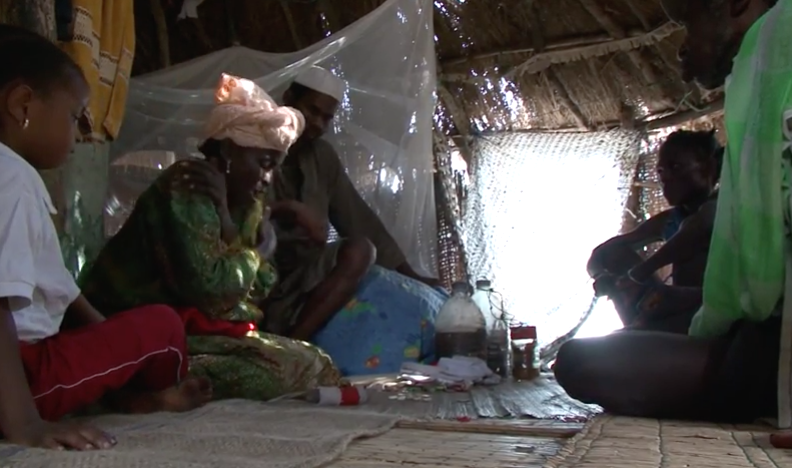
Do we go back do we stay. Its God who decides in the end. For the time being, we are in good health so that means we stay. Once I wanted to go back to my home, but people here asked me to stay.
Bijagos functions on the basis of exchange. If you want to stay you have to show them that you have something to offer them.
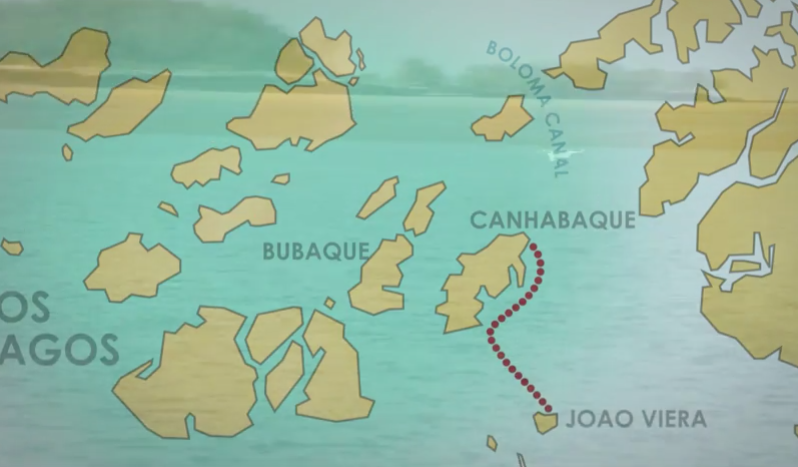
THE ISLAND OF JOAO VIERA
The Island of Joao Viera is a secret islands reserve for growing crops.
Claude was a shark fisherman before Bijagos natural park declared sharks as a protected species. He came her with his wife and family from Cassamance in Senegal to start a new life. His wife Marie knows the king of Menek, he has invited her to a ceremony. The family has been taking part in the everyday life of the village for several years now, The ship merchandise from Bisseau, do medicaql transpirtation and do other odd jobs. Its the tribute they pay for livwe a quiet life here,
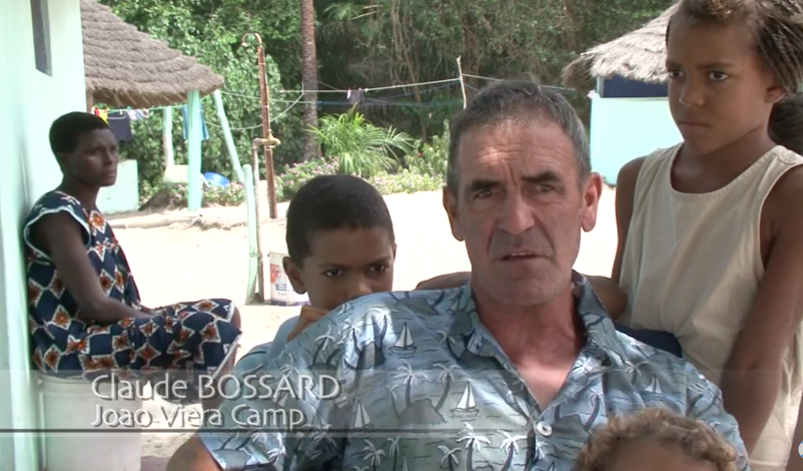
Claude Bossard says:
"They spend a third of their times on ceremony. They beleive in their God ands are realle inscrutable. They are not complicated you have to respect them. Nots just anyone can come and settle here. Its complicated. You have to prove your good will. You must not misbehave. They are very very conservative. The are not great hunters but great fishermen. They live and survive completely of their own. Its a completely different life here. You cannot compare them with the massais or the maroonies or amazonian indians, but the tribes here live in remot regions and have nothing to do with the government in Guinnea Bisseau. They are very special."
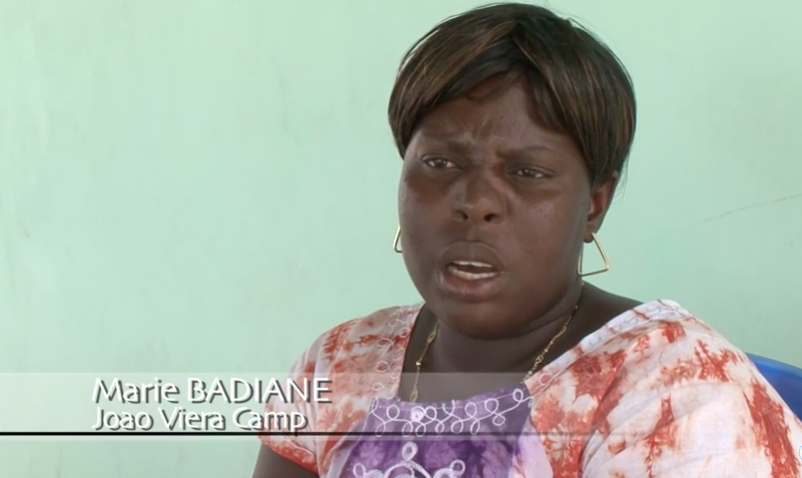
Marie Badiane says: They need help. They managae pretty wrell on their own, but still they need help especially when it comes to health.
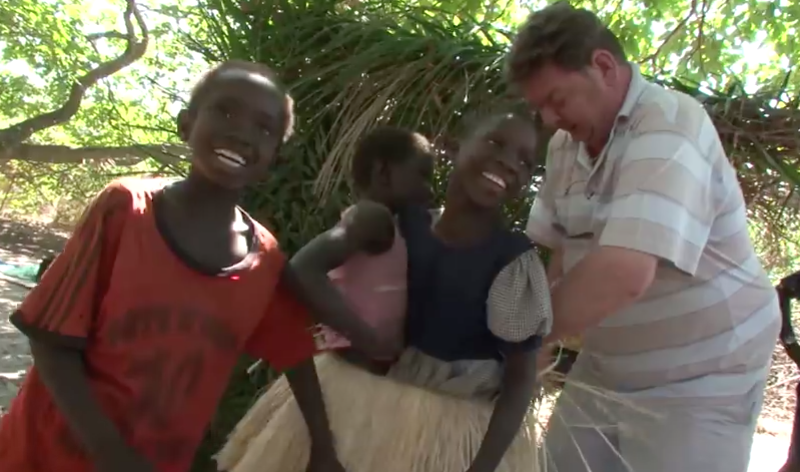
Our guardian Nicholas Mendy says: The people here are not used to seeing the tourists landing on their islands. Specially the children. So they might behave a little strangely, but it is just because of curiosity. I even saw a little Bijago lifting up a French girls dress to see what was underneath. But its really just curiousity. E
We have to tell the tourists not to give money. The don´t have any use of that. We mustn´t create needs.
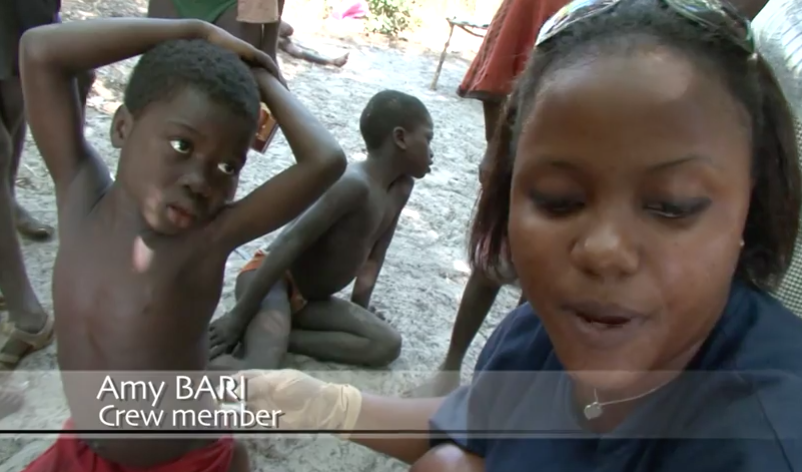
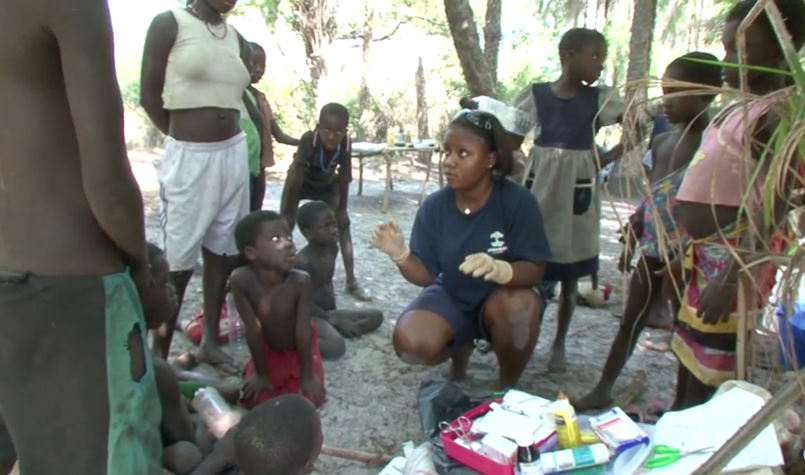
Amy Bari from the crew on board assists the islanders with health care.
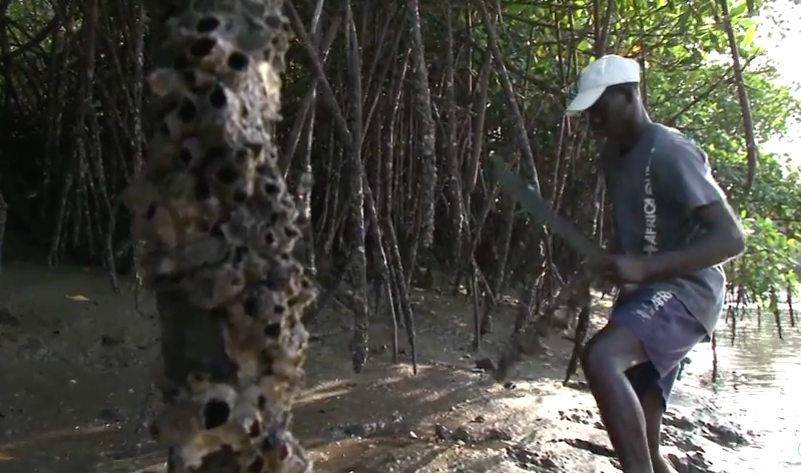
The crew on board go fishing and harvest oysters in the mangrove swamps. They are inmpressed by the hard life the islanders live. There are no connections between the islands. There is just one hospital in the whole archipelago and few schools. Even in the most remote communities in main land Africa the way of life has evolved. The ecocological equilibrum that the Bijagos have maintained since the dawn of time is of course quite topical now. But its still a subject to the outside world that comes knocking on its door more and more often.
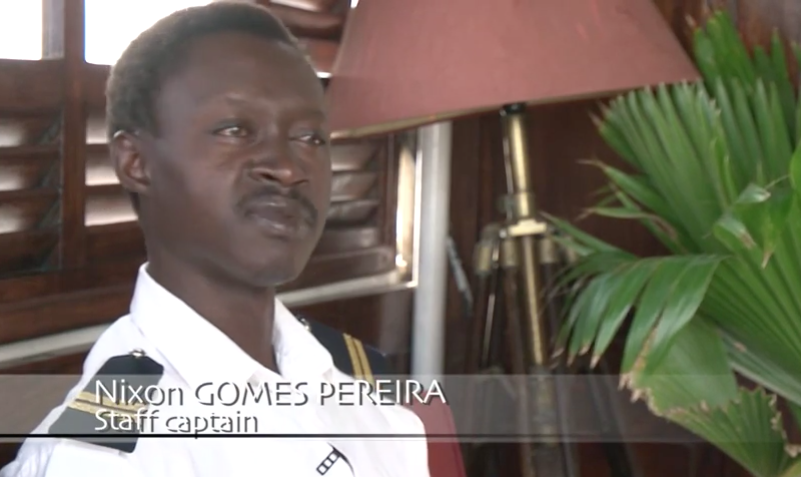
Staff captain Nixon Gomez Pereira says:
The world doesn´t stop turning. And colonisation is a thing of the past. We live in a time of globalisation. So even if we don´t want i - we have to accept it. These peoples need hospitals, schools - they have said they want schools and medical assistance. That´s why they have to do a trade off; They have to give up something to get something. In these days we can´t live like we did a hundred years ago. Its not possible.
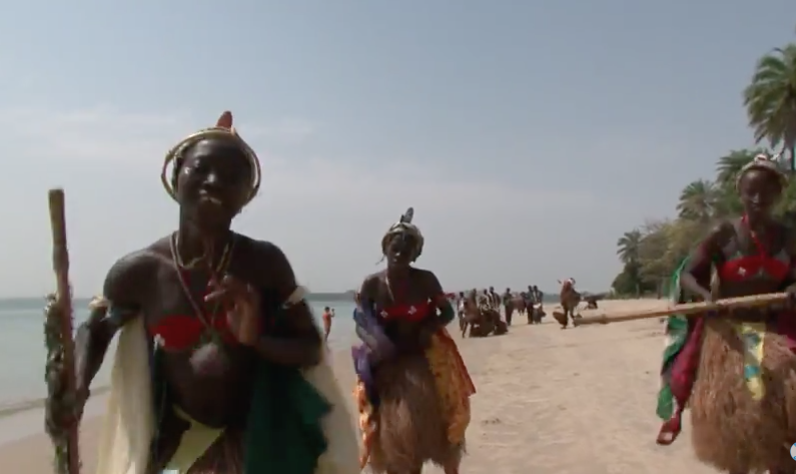
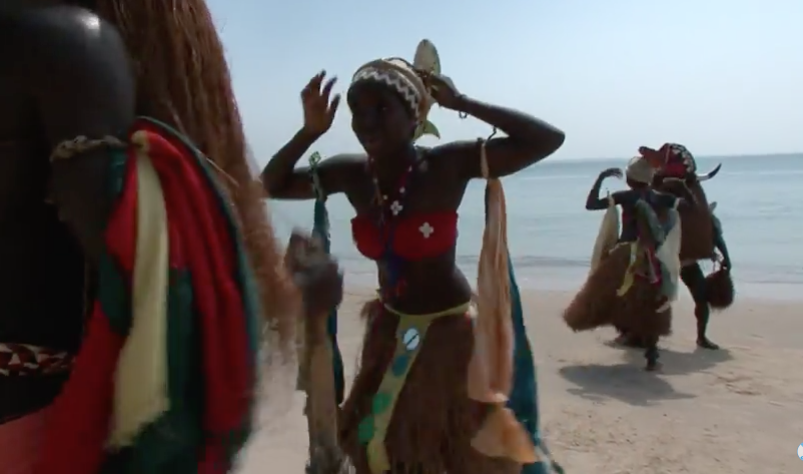
To be young in the Bijagos islands means you´re strong. You have lived through the rainy seasons and childhood deseases. Thanks to their masques and danses, these girls are going to visit the capital Bisseau to participate in the annual carneval, where the Bijagos are always a big hit. For the most parts the young people live their everyday life in the forest. They don´t often get the chanse to ride the boat to the mainland Bubaque where the local government and shops are concentrated. But her you need money to get into the cafés and discoteques.
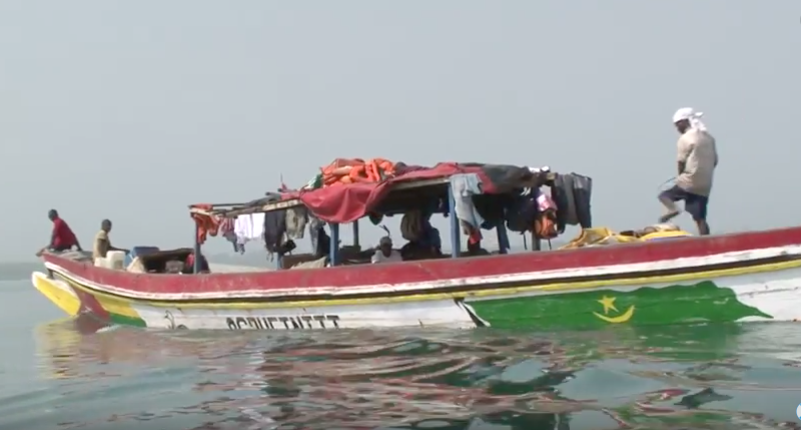
Fidel has done his very best to continue education. Bit he doesn´t forget his traditional custom when occation calls for it. The war between traditional and modern started ver early for this native son of Bubaque. You really have to have strong will to go to school. Otherwise it would´nt just happen. You cannot count on encouregment from your family. Just the opposite; They want you to work and to learn how to harvest the palm wine, palm oil, to learn how to fish, and grow rice - instead of to going to school. Because nowadays if you go to school what will you have to eat, if you don´t do any work?
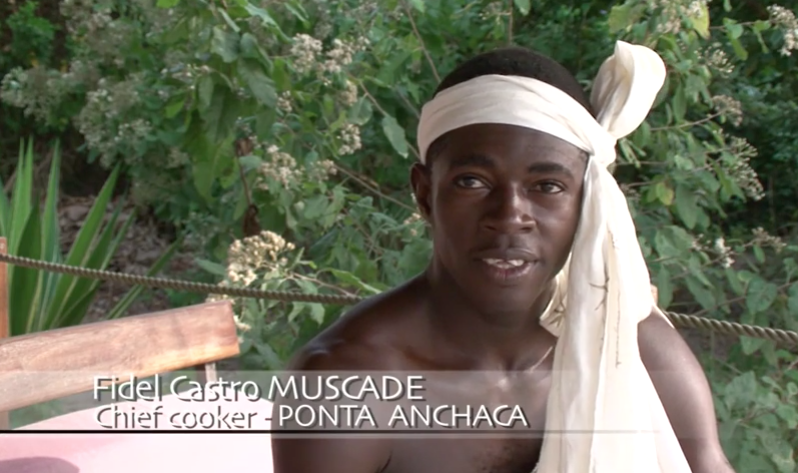
Education in the Bijagos really take place out in the forest and not in the classroom; To climb a palm tree to cast a net, to guide a pirogue through the mangrove swamp. These are all skills for the survival on these islands. Growing up without becoming an Omo grande is simple unthinkable.
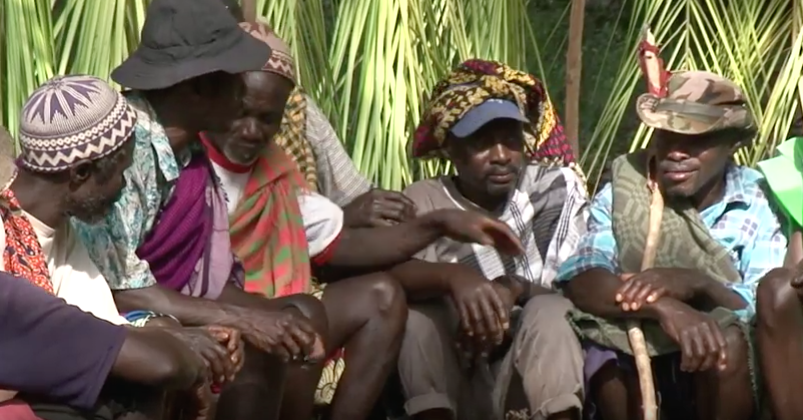
The king of this village died recently. Now they have to pick his successor from among the Omo Grande. But on the Bijagos the statues of the king is more of an ordeal than a honour. For if the king is not up to the task his days are numbered.
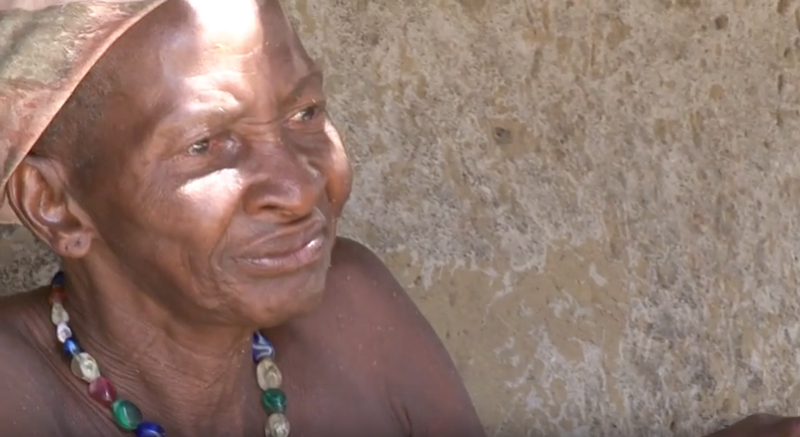
The king is dead. They have to choose a new king. Its the women who choose the king. The women come and they touch you: You yo´re now king! Everybody are afraid to be choosen to kings because that means you have to leave your family. And its hard living on your own. So they try to go off and hide. Be choosen to king means a lot of responsibility.
The problem is that some of them die after two or three years, so everybody is afraid.
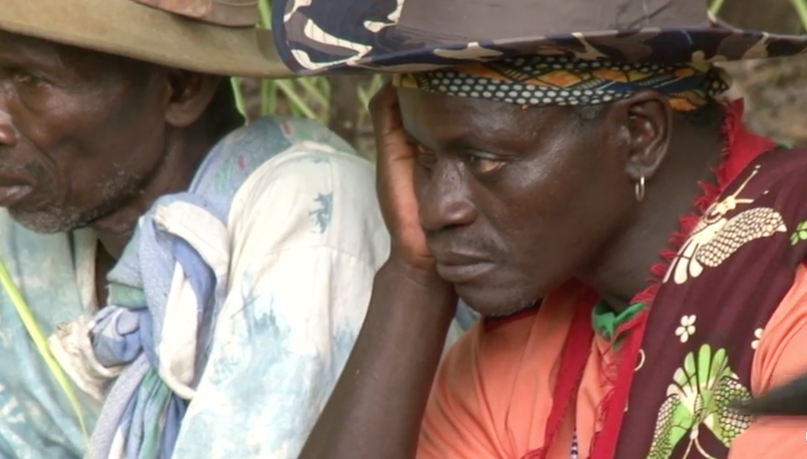
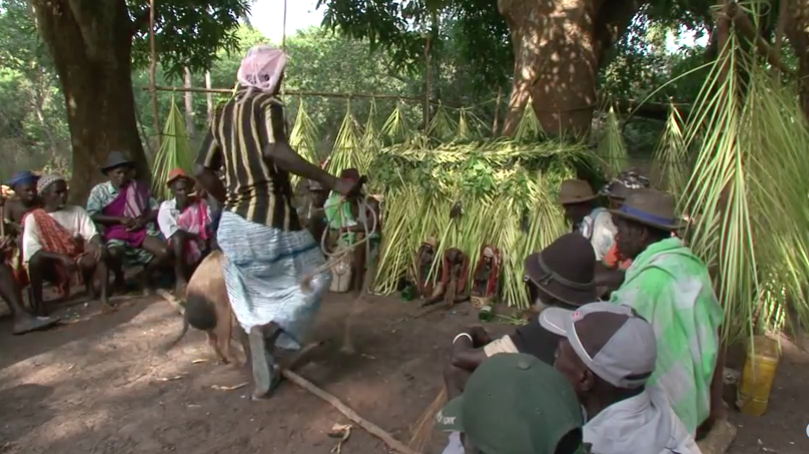
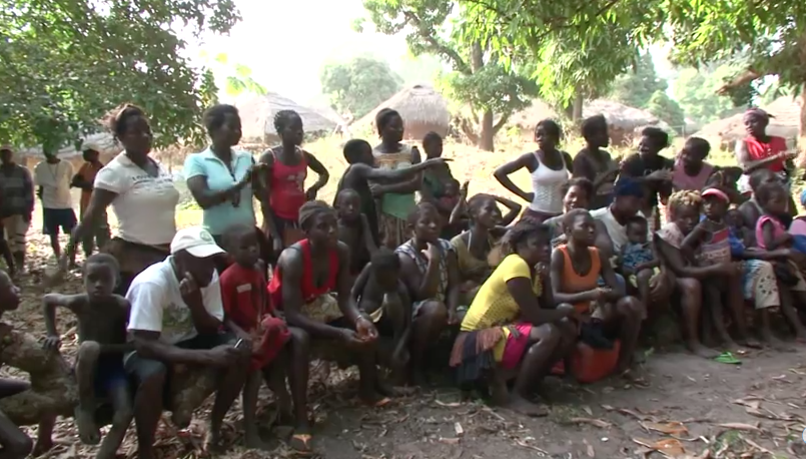
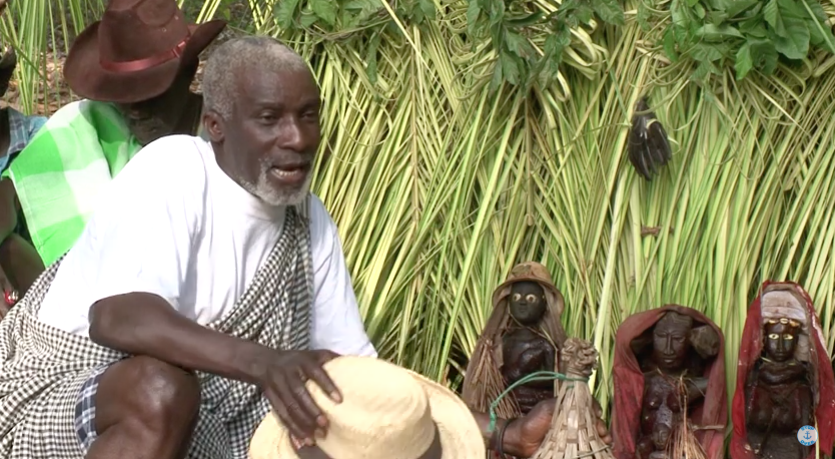
They are preparing for a ceremony here in the village of Bijante and everyone is invited. It often takes place in every beginning and end of the harvest. And every time the village is facing an important decision. The huts made of woven palm leaves stand behind the three irans; Wooden idols that symbolise each sector of the village. Each persons place is strictly set by his och her importance.
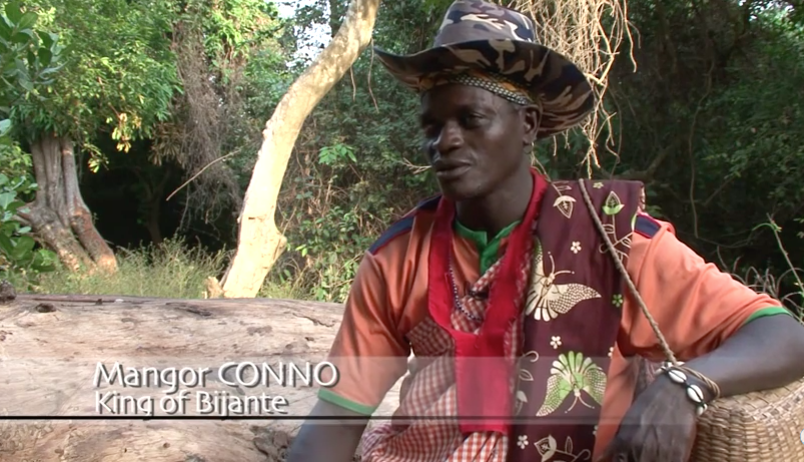
Mango Conno is recently choosen to the king of Bijante. Even though he is quite young he has already been initiated and the right to claim for the title Omo Grande. The King is very atttentive to the strict observance to protocol. In his presence the ritual must proceed without the slightest error of gesture, word or order.
The king is convicted that if the spirit are not happy, he is the one who must pay the prize. He still recall his recent designation:
It was the 22th of juli, in the evening. It was night. The took me. And I couldn´t say anything. When they grab you, they take you off to a secret place, and there you simply have to submit because you simply don´t know what will happen to you. You have to keep quiet. Its a decision taken by the whole village. its not my will. Its not like in other countries.
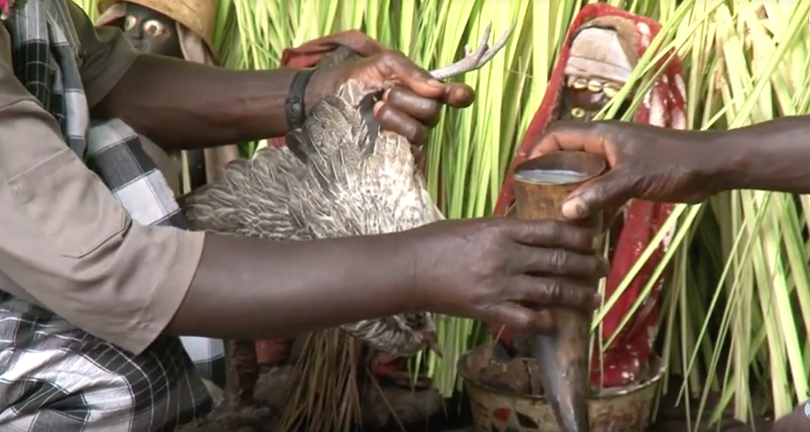
A sacrifice take place at each ceremony, the more important the request the bigger the animal. The blood and entrails feed the communication with the spirit of nature. The ceremony is the occasion to speak out under the authority each person can voice his or her opinion. Today the sacrifice was requested by an outsider the and her request for permission to stay. She stays apart outside the circle of the initiate. The discussion is all about her presence on the island and her request for promote tourism in the Bijagos If the Hotel Ant Chako wants to add an extra bungalo the question must be put to the spirits.
Once again its the chicken who has the final word:
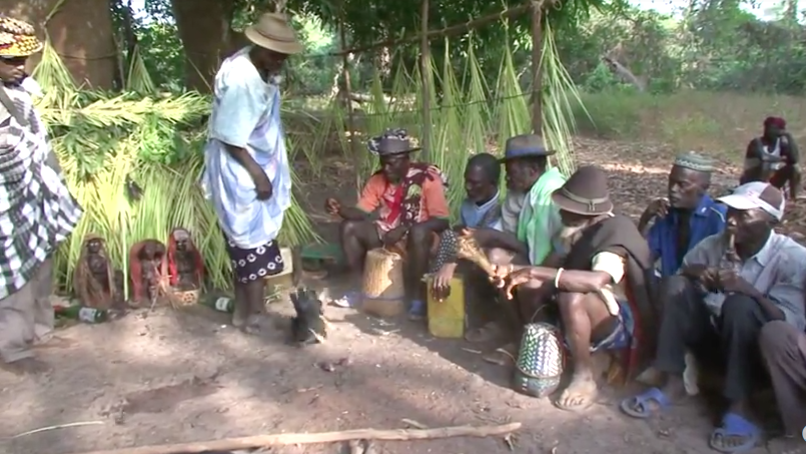
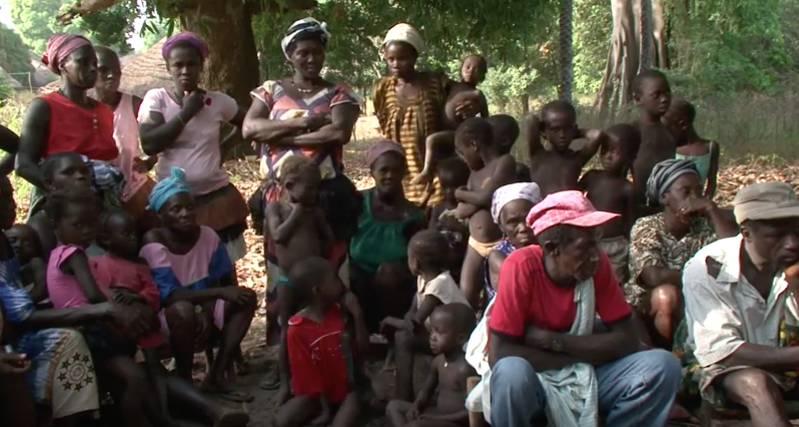
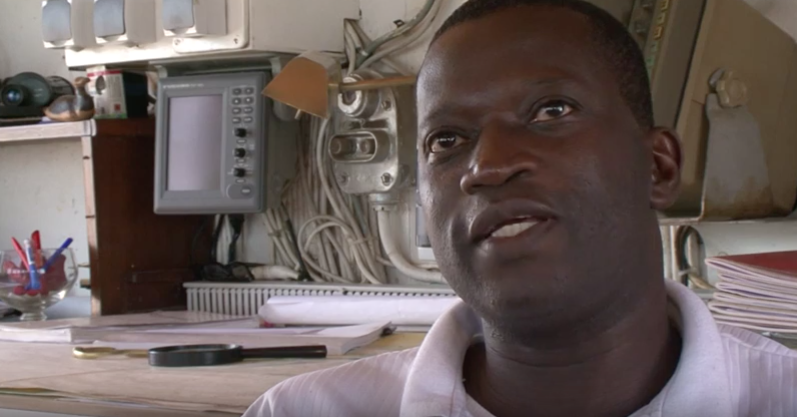
"These are two totally opposite worlds. Even I who am europeanised, I can see through them that I am not truly an African. I am African in my skin. I am African since I was born in Africa. But I don´t have the African culture. This culture that I learned about through visiting the Bijagos, who live as perhaps my grandparents did - they have no needs they don´t care about electricity, bicycles. They live naturally from hunting and gathering. Sometimes people think that they aren´t happy. But I think that they are very happy in their environment. I think that they are the ones who are right."
